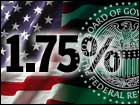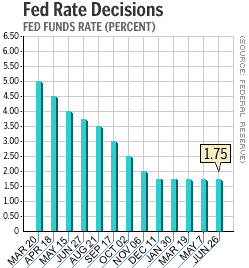
NEW YORK (CNN/Money) -
The Federal Reserve left a key interest rate unchanged Wednesday and said any risk to the U.S. economy was evenly balanced between the danger of economic weakness and the threat of inflation.
As expected, Fed policy makers decided to leave their target for the federal funds rate, an overnight bank lending rate, unchanged at 1.75 percent, the lowest level in more than 40 years.
"Sooner or later rates will have to come back up to at least a 'neutral' level," Bill Cheney, chief economist at John Hancock Financial Services, said in a note. "But for now they've got the monetary policy lever just about where they want it, and it makes sense to do as little as possible for as long as possible."
In the closely watched statement accompanying its decision, the Fed said that economic activity has continued to increase, but that economic growth from a change in inventories and expanded final demand had slowed down.

Fed policy makers added that they think final demand will pick up in "coming quarters," but the strength of that pickup is still uncertain, as it has been for several months.
"It was a very balanced statement," said Wells Fargo chief economist Sung Won Sohn. "Given the current fragile state of the stock market and the economy, they wanted to do nothing which might add to volatility, so they decided to say as little as possible."
The unanimous decision was widely expected and had little impact on U.S. stock prices, which continued to fall on the revelation by WorldCom Group (WCOM: Research, Estimates) of the largest episode of accounting impropriety in history.
In fact, the WorldCom announcement late Tuesday had led some observers to speculate that the Fed might cut rates or adjust its "bias" in favor of cutting rates in the future in an effort to calm nervous markets.
But most economists dismissed such action as unlikely, and the Fed did not address the issue in its statement.
"What can the Fed do about WorldCom? This is not an interest rate problem. This is not something they should be involved with," Bank One chief economist Diane Swonk told CNNfn's Money Gang program. "I'm sorry, Wall Street, but you can't look to the Fed to save you when they don't have the tools to save you on this one."
Fed policy makers, who next meet Aug. 13, also left the largely symbolic discount rate unchanged at 1.25 percent.
| |
 Related stories
Related stories
| |
| | |
| | |
|
The fed funds rate forms the basis for banks' prime lending rates and affects the cost of borrowing for consumers and businesses. The central bank cuts rates when it wants to stimulate the economy and raises them when it wants to slow the economy down.
Low rates also probably helped make the latest economic recession, which likely began in March 2001, among the shortest and mildest in history, keeping consumers spending despite terror attacks, rising unemployment, falling stock prices and other shocks.
The Fed cut rates 11 times in 2001, a record for a calendar year. It's left rates unchanged after four meetings so far in 2002, and most economists think it will leave rates alone until at least November because of uncertainty about the economy's recovery.
"The Greenspan Fed has inaction down to a fine art," said Cheney of John Hancock Financial Services. "They stood by through much of the late 1990s, allowing a very beneficial reduction in unemployment without suffering any inflationary consequences. When they do have to move, they do so quickly and surgically."
Government reports Wednesday showed orders for durable goods made in U.S. factories rose in May, raising hope that business spending, cited by Fed Chairman Alan Greenspan as key to the economy's strength, was picking up.
And, as the Fed hinted Wednesday, strong productivity gains, which enable companies to make goods more cheaply, should boost corporate profits in future quarters, encouraging more spending, more production and, many hope, more hiring.
| |
 Related links
Related links
| |
| | |
| | |
|
"Corporate profits are likely to rise at double-digit rates in the second half of the year," Wells Fargo's Sohn said. "And that will be hopefully enough to offset some of the negative psychology in the stock market -- assuming it doesn't get worse."
Meanwhile, sales of new homes set a record pace in May, helping to further boost consumer confidence and help ease the sting of the constant news about corporate scandals, from Enron Corp. to Martha Stewart.
Another factor influencing future Fed actions will be unemployment, which has hovered at or near 6.0 percent since December. Many economists have said the Fed is unlikely to start raising rates again until it sees a sustained recovery in the labor market.

|

